What are the foods allowed and not allowed on the Mediterranean Diet? Inspired by the eating habits of people living in countries bordering the Mediterranean Sea, the Mediterranean diet has been extensively studied and shown promising results in promoting overall well-being.

In this post, we will delve into the foods allowed and not allowed on the Mediterranean diet, explore the main foods that constitute this eating pattern, and address specific questions regarding its credibility, evidence-based approach, and traditional aspects.
Table of Contents
- Foods Allowed and Not Allowed on the Mediterranean Diet
- The Main Foods in a Mediterranean Diet: A Deeper Analysis
- Top 10 Foods on a Mediterranean Diet
- Contrasting the Mediterranean Dietary Pattern with Other Healthy Diets and Plant-Based Diet Programs
- Health Benefits of the Mediterranean Diet
- Frequently Asked Questions (FAQs)
What is the Mediterranean diet pattern?
The Mediterranean dietary pattern is a way of eating based on the traditional cuisines of countries bordering the Mediterranean Sea. It is characterized by a high intake of fruits, vegetables, whole grains, legumes, nuts, and seeds; a moderate intake of fish, poultry, and dairy; and a low intake of red meat, processed foods, and sugary drinks.
The Mediterranean eating pattern has been shown to have a number of health benefits, including reducing the risk of heart disease, stroke, type 2 diabetes, and some types of cancer. It has also been shown to improve cognitive function and longevity.
Foods Allowed and Not Allowed on the Mediterranean Diet
The Mediterranean diet is not a strict set of rules but rather a flexible framework that encourages the consumption of certain foods while limiting others.

Here, we outline the foods typically allowed and not allowed on this dietary pattern.
Allowed Foods on the Mediterranean Diet
1. Fruits and Vegetables: The Mediterranean diet strongly emphasizes a wide variety of fruits and vegetables. Tomatoes, leafy greens, onions, garlic, zucchini, eggplant, and citrus fruits are commonly included in meals, providing essential vitamins, minerals, and dietary fiber.
2. Legumes: Chickpeas, lentils, and beans are staple legumes in the Mediterranean diet, offering a plant-based source of protein, fiber, and essential nutrients.
3. Whole Grains: Whole grains like whole wheat, oats, barley, and brown rice are preferred over refined grains, providing complex carbohydrates, fiber, and a range of vitamins and minerals.
4. Healthy Fats: Extra virgin olive oil is a primary source of added fat in Mediterranean cuisine, supplying monounsaturated fatty acids that have been linked to heart health. Nuts and seeds, such as almonds, walnuts, and flaxseeds, are additional sources of healthy fats.
5. Fish and Seafood: Fatty fish like salmon, sardines, and mackerel are rich in omega-3 fatty acids, contributing to heart health. Fish and seafood are typically consumed at least twice a week.
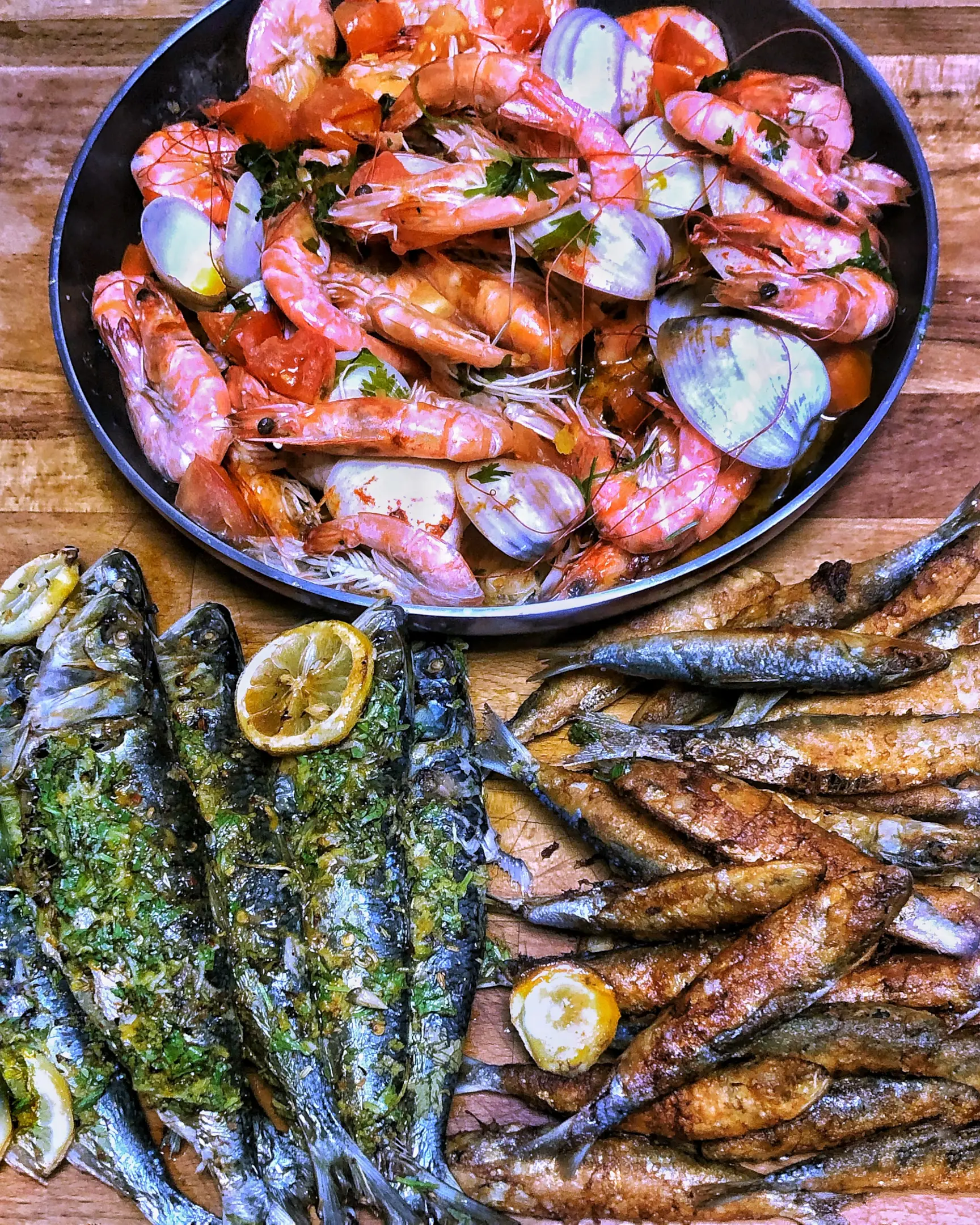
6. Poultry: Chicken and turkey are included in moderation as sources of lean protein. Red meat is limited in the Mediterranean diet.
7. Dairy Products: Moderate amounts of yogurt and cheese are consumed in the Mediterranean diet, providing calcium and probiotics that support gut health. However, it’s worth noting that dairy consumption may vary in different regions following a Mediterranean-style diet.
Not Allowed Foods on the Mediterranean Diet
1. Processed Meats:
Foods like sausages, bacon, and deli meats are discouraged due to their high sodium and saturated fat content, which can contribute to the prevention of cardiovascular disease and diseases.
2. Added Sugars and Sugary Beverages:
Excessive consumption of sugary foods and drinks is discouraged as it can lead to weight gain, insulin resistance, and increased risk of chronic diseases.
3. Refined Grains and Processed Foods:
White bread, pasta made from refined grains, and processed snacks are not typically part of the Mediterranean diet. Instead, whole grains are preferred.
4. Trans Fats:
Foods containing trans fats, such as margarine and many commercially baked goods, are avoided due to their negative impact on heart health.
5. Sweets and Desserts:
While the Mediterranean diet allows for occasional indulgences, sweets and desserts are generally consumed in moderation to maintain a balanced intake.

Table of Allowed Foods vs. Not Allowed Foods on the Mediterranean Diet
Here’s a table summarizing what can and cannot be eaten on the Mediterranean Diet:
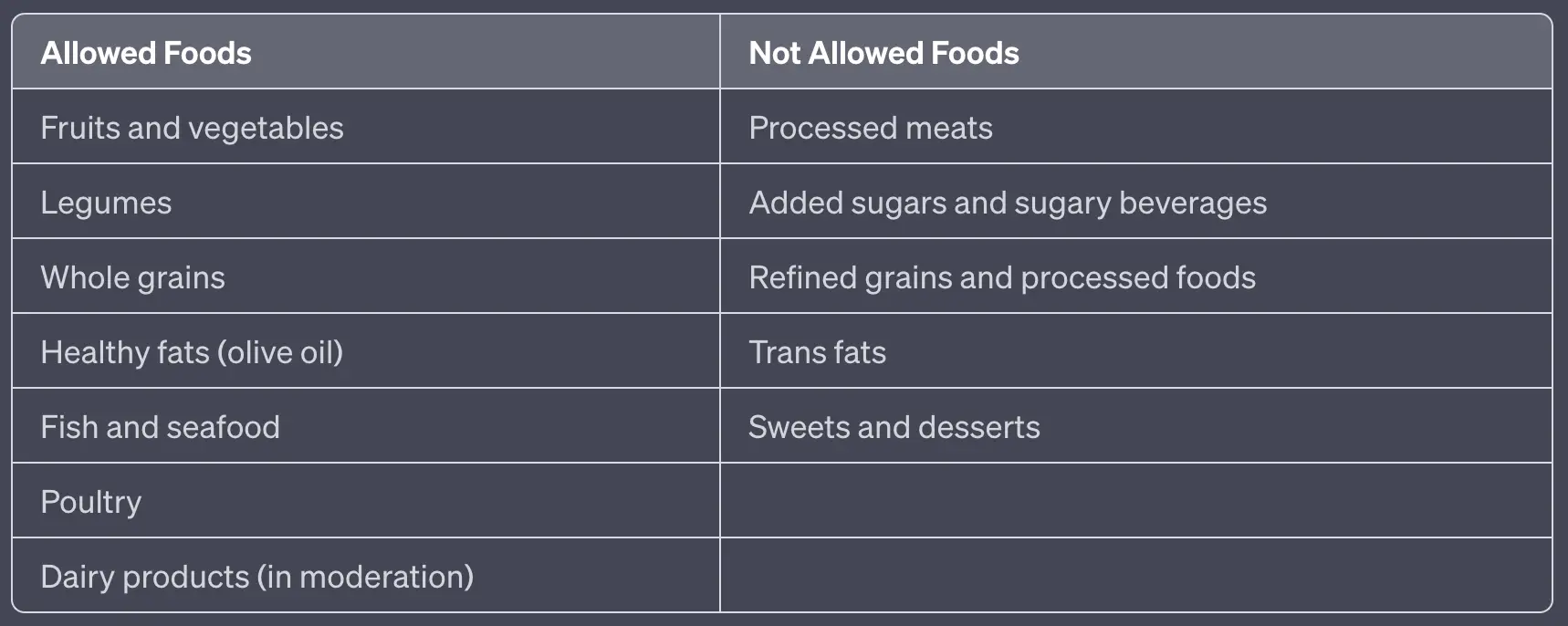
Please note that the tables in this post provide a general overview and are not exhaustive lists.
The Mediterranean Diet encourages the consumption of whole, minimally processed foods, primarily plant-based sources while limiting processed and sugary foods. Customizing the Mediterranean diet according to personal preferences and dietary needs is important.
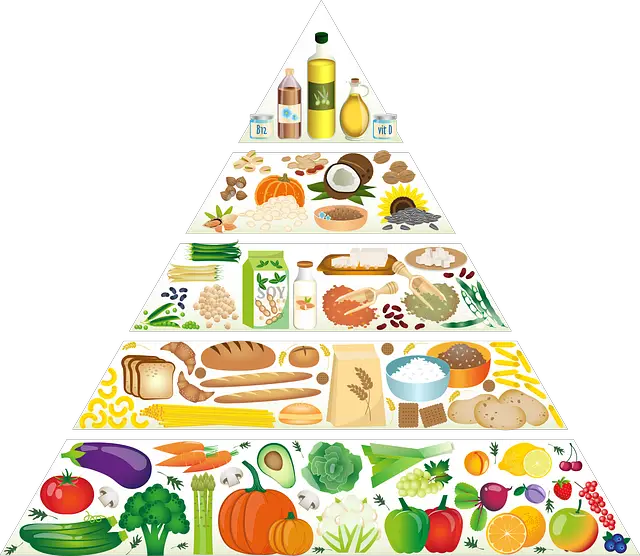
The Main Foods in a Mediterranean Diet: A Deeper Analysis
The Mediterranean diet emphasizes whole, minimally processed foods, predominantly plant-based sources, and lean proteins. Here, we delve into the main foods that constitute the core of the Mediterranean diet.
The Mediterranean diet, renowned for its health-promoting qualities, encompasses many wholesome and flavorful foods.
Analyzing the main foods that comprise this dietary pattern provides insights into its nutritional richness and cultural significance.
This section will explore the top 10 foods on a Mediterranean diet and typical breakfast, lunch, and dinner options.

Top 10 Foods on a Mediterranean Diet
1. Olive Oil:
At the heart of the Mediterranean diet is olive oil, especially extra virgin olive oil, a key source of monounsaturated fats, antioxidants, and anti-inflammatory compounds. Its versatile use in cooking, dressings, and dips makes it a staple in the Mediterranean region.
2. Fruits and Vegetables:
The Mediterranean diet strongly emphasizes an abundant variety of fruits and vegetables. These nutrient-rich powerhouses provide an array of vitamins, minerals, fiber, and antioxidants. Tomatoes, cucumbers, peppers, leafy greens, citrus fruits, and olives are commonly enjoyed.
3. Whole Grains:
Whole grains, such as whole wheat, barley, oats, and brown rice, provide complex carbohydrates, fiber, and essential nutrients. These grains are preferred over refined grains, offering sustained energy and promoting digestive health.
4. Legumes:
Chickpeas, lentils, beans, and peas are excellent plant-based protein sources in the Mediterranean diet. Legumes are rich in fiber, vitamins, minerals, and phytochemicals and contribute to satiety and overall well-being.
5. Fish and Seafood:
The Mediterranean Sea teems with abundant fish and seafood, which are central to the diet. Fatty fish like salmon, sardines, and mackerel deliver omega-3 fatty acids, promoting heart health and reducing inflammation.
6. Poultry:
Lean poultry sources, such as chicken and turkey, feature moderately in Mediterranean cuisine. These proteins offer essential amino acids while being lower in saturated fats than red meat.
7. Nuts and Seeds:
Almonds, walnuts, pistachios, and flaxseeds are typical choices in the Mediterranean diet. These nutrient-dense powerhouses supply healthy fats, protein, fiber, vitamins, and minerals, contributing to heart health and overall vitality.
8. Yogurt and Cheese:
Dairy products, particularly yogurt, and cheese, are consumed in moderation in Mediterranean countries. These provide calcium, probiotics, and protein, promoting bone health and supporting a healthy gut microbiome.
9. Herbs and Spices:
Mediterranean cuisine relies on herbs and spices to enhance flavors and reduce the need for excessive salt. Basil, oregano, rosemary, thyme, garlic, and onion add depth and complexity to traditional foods, enriching both taste and health benefits.
10. Red Wine (in moderation):
Red wine, consumed in moderation, is a notable feature of the Mediterranean diet. It provides antioxidants, particularly resveratrol, which has been associated with cardiovascular benefits. However, it’s important to note that moderation is key, and excessive alcohol consumption should be avoided.
What is a typical Mediterranean breakfast?
A traditional Mediterranean diet breakfast reflects the simplicity and freshness of the diet. It often consists of whole grain bread or toast, drizzled with olive oil and topped with fresh tomatoes, cucumbers, and a sprinkling of feta cheese or olives.

Seasonal fruits, such as oranges or grapes, are enjoyed alongside Greek yogurt or a small portion of eggs. This combination provides a balanced mix of carbohydrates, healthy fats, protein, vitamins, and minerals to start the day on a nourishing note.
Here’s a table summarizing what can and cannot be eaten on the Mediterranean Diet for breakfast:
What is a typical Mediterranean lunch?
A typical Mediterranean lunch is a delightful affair that incorporates fresh ingredients and a balance of flavors. It embraces the region’s culinary traditions and highlights the diet’s emphasis on plant-based foods, lean proteins, and healthy fats. Here, we delve into the components of a Mediterranean lunch.

The main course of a Mediterranean lunch often features a generous serving of fresh vegetables and leafy greens. A colorful salad with various vegetables like tomatoes, cucumbers, bell peppers, and onions takes center stage.
This salad is typically dressed with a drizzle of extra virgin olive oil, a squeeze of lemon juice, and a sprinkle of herbs and spices, elevating the flavors.
Here’s a table summarizing what can and cannot be eaten on the Mediterranean Diet for lunch:
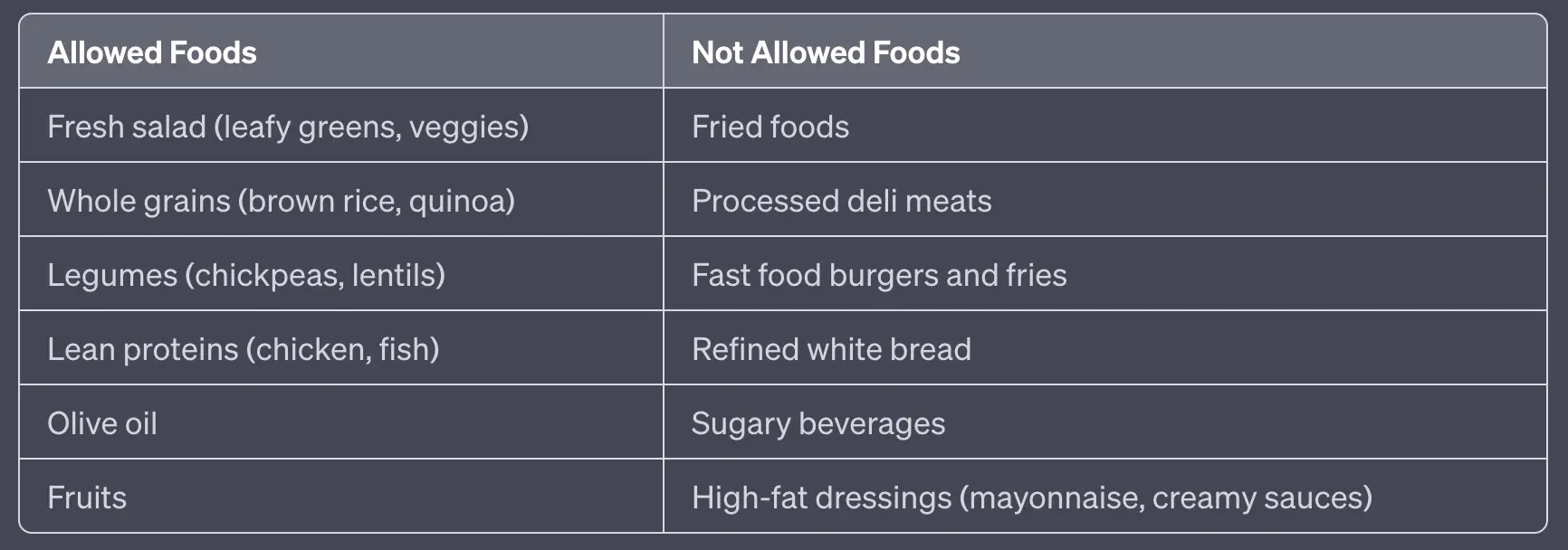
Whole grains also make an appearance in a Mediterranean lunch. Whether it’s a side dish of whole wheat couscous, quinoa, or a slice of whole grain bread, these options provide complex carbohydrates, fiber, and additional nutrients.
Lean proteins, such as grilled chicken or fish, often complement the Mediterranean lunch. These proteins are prepared with minimal added fats and are seasoned with herbs and spices for added flavor.
The fish component may include nutrient-rich options like salmon or sardines, which deliver beneficial omega-3 fatty acids.

Legumes, like chickpeas or lentils, are another common addition to a Mediterranean lunch. They serve as a source of plant-based protein, fiber, and various vitamins and minerals. Legumes are often featured in soups, stews, or as a side dish.
A typical Mediterranean diet lunch also includes a small portion of dairy products, like a serving of Greek yogurt or a slice of cheese. These provide calcium, probiotics, and additional protein, promoting bone health and gut health.

Fresh fruits make for a refreshing and nutritious dessert or snack option to conclude a Mediterranean lunch. Popular choices include oranges, grapes, melons, or a simple fruit salad.
Overall, a typical Mediterranean lunch embodies the principles of balance, variety, and moderation. It showcases a rich combination of vegetables, whole grains, lean proteins, legumes, and healthy fats, offering a wholesome and satisfying meal.
What is a typical Mediterranean dinner?
A typical Mediterranean dinner is a leisurely and convivial affair, often enjoyed with family or friends. It embraces the idea of simplicity, quality ingredients, and the pleasure of sharing a meal.
Let’s explore the components of traditional food cultures that characterize a Mediterranean dinner.

The Mediterranean dinner starts with various meze or appetizers that showcase the diversity of flavors and textures. These may include hummus, tzatziki, baba ganoush, or a platter of olives and marinated vegetables.
These flavorful starters are typically served with whole-grain bread, allowing diners to savor the combination of dips, spreads, and bread.
The main dinner course of a Mediterranean diet often revolves around vegetables, lean proteins, and whole grains. Grilled or roasted vegetables like eggplant, zucchini, peppers, and tomatoes take center stage. These are typically seasoned with herbs, garlic, and extra virgin olive oil to enhance the flavors.
Here’s a table summarizing what can and cannot be eaten on the Mediterranean Diet for dinner:
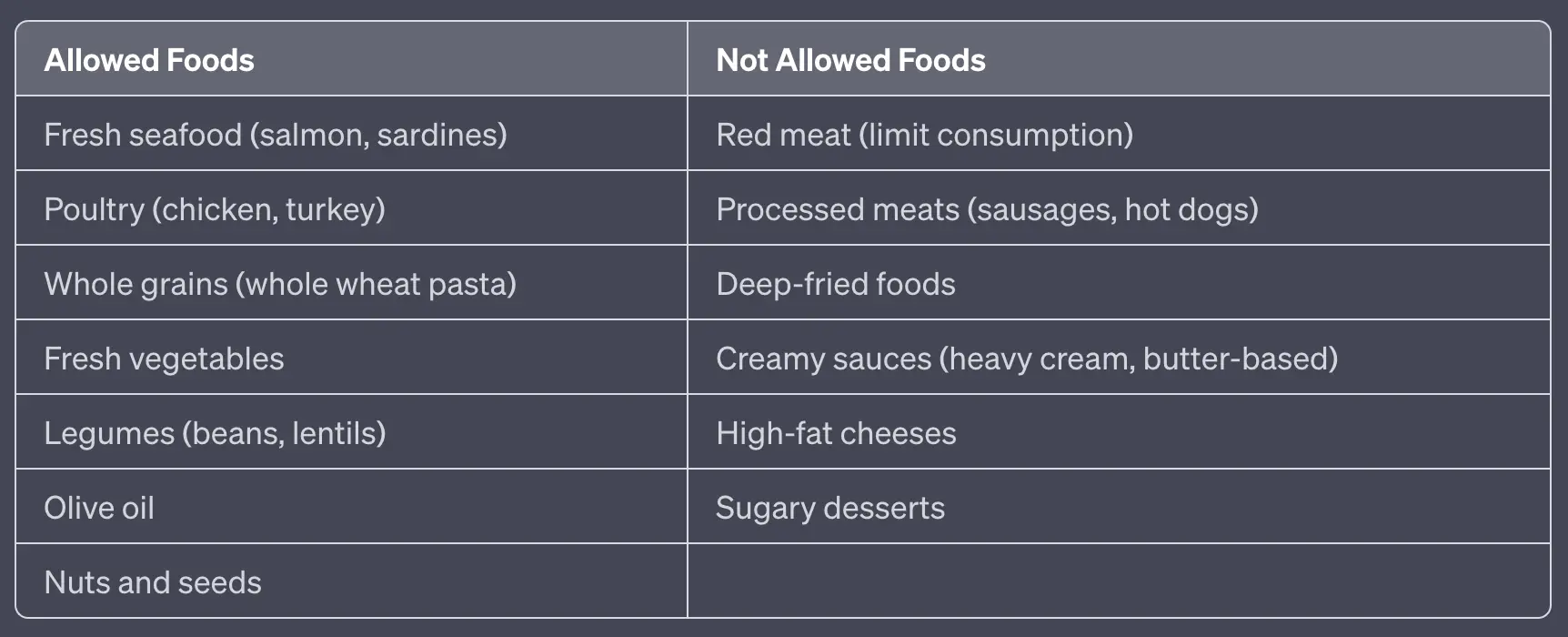
Lean proteins, such as fish or poultry, are popular choices for a Mediterranean dinner. Grilled or baked fish, such as sea bass or cod, are often enjoyed alongside a fresh lemon sauce or herb-infused extra virgin olive oil.
Grilled chicken or turkey may also make an appearance, marinated with Mediterranean herbs like oregano and thyme.

Whole grains, such as couscous, bulgur, or brown rice, accompany the main course. These grains provide a hearty and nutritious meal, contributing complex carbohydrates and additional fiber.
A typical Mediterranean dinner embraces the concept of shared dishes, allowing diners to create their own combinations and sample various flavors.
It is not uncommon for a table to be filled with an assortment of small plates and platters showcasing an array of delicacies.

This communal dining experience encourages conversation, laughter, and a sense of togetherness. It’s a time to savor the richness of Mediterranean cuisine and enjoy dishes like stuffed grape leaves, grilled octopus, fresh salads, roasted lamb or chicken, and flavorful sauces like tzatziki or pesto.
Accompanied by a glass of red wine or a refreshing Mediterranean-inspired cocktail, the dinner unfolds slowly, allowing everyone to indulge in the sensory delights of the meal.

The emphasis on fresh, seasonal ingredients, combined with the art of slow and mindful eating, makes a typical Mediterranean dinner not just a nourishing experience for the body but also a celebration of community and the pleasure of good food.
What is a Typical Mediterranean Snack?
A typical Mediterranean snack showcases the region’s fondness for fresh ingredients that provide a burst of flavor and nutrition. Mediterranean snacks often prioritize fruits, vegetables, nuts, and dairy products, balancing healthy carbohydrates, proteins, and fats. Here, we explore some Mediterranean diet examples of typical snacks.
Fresh fruits play a prominent role in Mediterranean snacking. Whether it’s a juicy peach, a handful of berries, or slices of melon, fruits offer natural sweetness, vitamins, minerals, and dietary fiber. They are enjoyed as is or paired with a small portion of Greek yogurt for added protein and creaminess.
Vegetables are also a popular choice for Mediterranean snacks. Crisp cucumber slices, cherry tomatoes, and baby carrots are often served with a side of hummus or tzatziki, creating a satisfying and refreshing snack. These combinations provide a mix of hydration, antioxidants, and fiber.
Nuts and seeds are another staple of Mediterranean snacking. Almonds, walnuts, pistachios, and sunflower seeds offer a satisfying crunch and are rich in healthy fats, protein, and essential nutrients.
A handful of mixed nuts or a homemade trail mix can provide sustained energy and satiety.
Cheese, such as feta or halloumi, is often enjoyed as a Mediterranean snack. These cheeses are paired with fresh or dried fruits, adding a savory and tangy element to the overall taste experience. The combination of cheese and fruits provides a balance of flavors and textures.
Olives, a beloved Mediterranean ingredient, are frequently enjoyed as a snack. With their rich, briny taste, olives are a source of healthy fats and antioxidants. They can be enjoyed on their own or added to salads and other dishes.
Overall, a typical Mediterranean snack celebrates the simplicity and quality of ingredients. It embraces the concept of nourishing the body with wholesome foods that provide both enjoyment and nutritional value.
What is a Typical Mediterranean beverage?
Mediterranean beverages reflect the region’s rich cultural heritage and the appreciation for refreshing and invigorating flavors.
They range from traditional options to modern interpretations, all with a focus on natural ingredients and delightful combinations.
Here, we explore some examples of typical Mediterranean beverages.
Water
Water is the foundation of Mediterranean hydration, often infused with fruits or herbs. Infused water, such as lemon or cucumber-infused water, offers a refreshing twist and encourages adequate hydration throughout the day.
Herbal Tea
Herbal teas are commonly enjoyed in the Mediterranean. Varieties like chamomile, mint, sage, and rosemary are cherished for their calming and aromatic qualities. These teas are often sipped after a meal or as a soothing beverage throughout the day.
Coffee
Greek coffee, a strong and richly flavored brew, is popular in Greece and other Mediterranean countries. Served in small cups, it is enjoyed slowly, allowing for conversation and relaxation.
The brewing process is an art, with finely ground coffee beans boiled in a traditional pot called a briki.
Citrus Juice
Freshly squeezed juices, particularly citrus juices, are a vibrant and refreshing option. Orange, grapefruit, and lemonade are enjoyed for their invigorating flavors and high vitamin C content. These juices can be consumed independently or mixed with sparkling water for a fizzy twist.
Wine
Wine, especially red wine, is special in Mediterranean culture and cuisine. Enjoyed in moderation, wine is often served with meals or shared during social gatherings. It pairs beautifully with Mediterranean flavors and is appreciated for its complex notes and potential health benefits.
Aperitifs
Non-alcoholic aperitifs like the Italian favorite Aperol Spritz or the Greek Ouzo with water are popular for leisurely aperitifs or pre-dinner drinks.
These beverages offer a variety of flavors and are often accompanied by small bites of olives, nuts, or cheese.
Contrasting the Mediterranean Dietary Pattern with Other Healthy Diets and Plant-Based Diet Programs
The Mediterranean dietary pattern stands out among various healthy diets and plant-based diet programs due to its unique characteristics and holistic approach to nutrition.
Let’s explore how the Mediterranean diet compares and contrasts with other popular healthy diets and plant-based healthy eating programs.
Mediterranean Diet vs. Other Healthy Diets
1. Mediterranean Diet vs. DASH Diet: The DASH (Dietary Approaches to Stop Hypertension) diet focuses on reducing sodium intake to lower blood pressure.
While the Mediterranean and DASH diets emphasize whole foods and limit processed foods, the Mediterranean diet emphasizes healthy fats, including extra virgin olive oil and nuts. It also encourages moderate alcohol consumption, which sets it apart from the DASH diet.
2. Mediterranean Diet vs. Ketogenic Diet: The ketogenic diet is a low-carbohydrate, high-fat diet designed to promote ketosis, a metabolic state in which the body primarily burns fat for energy.
In contrast, the Mediterranean diet emphasizes a balanced intake of macronutrients, emphasizing healthy fats, complex carbohydrates, and lean proteins.
The Mediterranean diet includes moderate amounts of carbohydrates from whole grains, fruits, and vegetables, which differs significantly from the low-carbohydrate nature of the keto diet.
3. Mediterranean Diet vs. Paleo Diet: The paleo diet emphasizes consuming foods our ancestors would have eaten during the Paleolithic era, focusing on lean meats, fish, fruits, vegetables, nuts, and seeds while excluding grains, legumes, and dairy products.
While both diets prioritize whole, unprocessed foods, the Mediterranean diet includes a wider variety of foods, such as whole grains, legumes, and dairy products.
Compared to the paleo diet, the Mediterranean diet also emphasizes healthy fats, such as olive oil.
Contrasting the Mediterranean Diet with Plant-Based Diet Programs
1. Mediterranean Diet vs. Vegetarian Diet: A vegetarian diet excludes meat and seafood but may include dairy products and eggs.
The Mediterranean diet, on the other hand, allows for moderate consumption of poultry, fish, and dairy products.
While both dietary patterns emphasize plant-based foods, the Mediterranean diet offers more flexibility in terms of incorporating animal-based proteins.
2. Mediterranean Diet vs. Vegan Diet: A vegan diet excludes all animal products, including meat, fish, dairy, eggs, and honey. The Mediterranean diet includes animal-based proteins in moderation, such as poultry, fish, and dairy.
Additionally, the Mediterranean diet strongly emphasizes the consumption of healthy fats, such as olive oil and nuts, which sets it apart from many vegan dietary patterns.
3. Mediterranean Diet vs. Whole Food Plant-Based Diet: The whole food plant-based (WFPB) diet focuses on consuming minimally processed plant foods and avoiding animal products and added oils.
While the Mediterranean diet emphasizes plant-based foods, it also includes moderate animal foods, animal-based proteins and healthy fats, such as fish, poultry, dairy foods, and olive oil.
The Mediterranean diet offers a more flexible approach to incorporating certain animal-based foods.
Health Benefits of the Mediterranean Diet
The Mediterranean diet has been extensively studied and has garnered attention for its numerous health benefits.
Its emphasis on whole, minimally processed foods, an abundance of fruits and vegetables, healthier fats, lean proteins, and moderate consumption of red wine has been associated with various positive outcomes.
Let’s delve into the health benefits of the Mediterranean diet, backed by facts and figures.
1. Cardiovascular Health:
The Mediterranean diet has been linked to a reduced risk of coronary heart disease and stroke. Research suggests that adherence to these healthy eating patterns is associated with a 30% lower risk of cardiovascular disease and mortality rates.
The high intake of monounsaturated fats from olive oil, omega-3 fatty acids from fish, and fiber from fruits, vegetables, and whole grains contribute to improved heart health.
2. Weight Management:
The Mediterranean diet is known for its weight management benefits. Studies have shown that this dietary approach effectively promotes weight loss and maintains a healthy weight.
The high fiber content, nutrient density, and balanced macronutrient composition contribute to increased satiety and reduced calorie intake.
3. Type 2 Diabetes Prevention:
A Mediterranean diet is associated with a lower risk of developing type 2 diabetes.
Research indicates that adherence to this Mediterranean eating style and healthy eating patterns reduces the incidence of diabetes by approximately 20%. View the section below on blood sugar control.
The diet’s emphasis on whole grains, legumes, fruits, vegetables, healthy fats, and moderate alcohol consumption helps regulate and promote healthy blood sugar levels and improve insulin sensitivity.
4. Cancer Prevention:
The Mediterranean diet has shown the potential to reduce the risk of certain types of cancer, including breast, colorectal, and prostate cancers.
The abundant intake of antioxidant-rich fruits, vegetables, and olive oil, combined with the anti-inflammatory properties of this diet, may contribute to its protective effects against cancer development.
5. Brain Health:
The Mediterranean diet has been associated with improved cognitive function and a reduced risk of neurodegenerative diseases such as Alzheimer’s and Parkinson’s.
The combination of antioxidant-rich foods, omega-3 fatty acids, and nutrients like vitamin E and folate may support brain health and protect against age-related cognitive decline.
6. Longevity:
Studies have shown that adherence to the Mediterranean diet is associated with a longer lifespan.
The diet’s overall nutrient profile, emphasis on plant-based foods, and promotion of healthful fats and moderate alcohol consumption contribute to a reduced risk of premature mortality.
It’s important to note that the health benefits of the Mediterranean diet are not solely attributed to individual components but rather the overall Mediterranean eating pattern and lifestyle.
The Mediterranean diet encompasses a holistic approach to eating, combining nutritious foods with physical activity, social engagement, and mindful healthy eating patterns.
By incorporating the Mediterranean diet into daily life, individuals can enjoy various benefits, promoting longevity and overall well-being.
The Timeframe for Health Benefits of the Mediterranean Diet
Embarking on the Mediterranean diet can bring about various health benefits, but it’s important to understand that the timeframe for seeing these benefits may vary among individuals.
The Mediterranean diet is not a quick-fix solution but a long-term lifestyle approach that promotes overall well-being.
Here, we provide perspective on the time it takes to start seeing benefits and delve into its impact on blood pressure and inflammation.
How long does it take to experience health benefits when on the Mediterranean Diet?
The exact timeframe for experiencing health benefits from the Mediterranean diet may differ depending on factors such as individual health status, adherence to the diet, and pre-existing conditions.
However, research suggests that positive changes can occur relatively quickly.
Some studies have shown that adopting the Mediterranean diet for three months can improve several health markers.
In a randomized controlled trial published in The New England Journal of Medicine, participants following the Mediterranean diet demonstrated significant reductions in cardiovascular risk factors, including blood pressure and lipid profiles, after just three months of adherence low fat diet.
It’s important to note that long-term adherence to the Mediterranean diet yields the greatest benefits.
However, you should always talk to your doctor about the best options for your health needs and body type.
As individuals maintain the diet over months and years, the cumulative effects on health become more pronounced, leading to a reduced risk of chronic diseases and improved overall well-being.
Impact on Blood Pressure of the Mediterranean Diet
High blood pressure, or hypertension, is a significant risk factor for cardiovascular diseases. The Mediterranean diet has been shown to impact blood pressure levels positively.
Multiple studies have demonstrated that adhering to the Mediterranean diet can lead to reductions in blood pressure.

For example, a systematic review and meta-analysis published in the Journal of Hypertension found that individuals following the Mediterranean diet experienced significant decreases in both systolic and diastolic blood pressure compared to control groups.
The diet’s emphasis on plant-based foods, lean proteins, healthy fats, and moderate alcohol consumption likely contributes to its blood pressure-lowering effects.
The high intake of fruits, vegetables, whole grains, and olive oil, along with reduced sodium consumption, promotes optimal blood pressure regulation.
Healthy Blood sugar levels and the Mediterranean diet
Here are some data and stats on the impact of the Mediterranean diet on blood sugar levels:
A study published in Diabetes Care found that people who followed a Mediterranean diet for 12 weeks had significantly lower HbA1c levels (a measure of blood sugar control over the long term) than those who followed a standard diabetes diet.
The study participants who followed the Mediterranean diet had an average HbA1c reduction of 0.6%, while those who followed the standard diabetes diet had an average HbA1c reduction of 0.3%.
A meta-analysis of 14 studies found that people who followed a Mediterranean diet had a 23% lower risk of developing type 2 diabetes than those who did not follow a Mediterranean diet.
A study published in the journal Nature Medicine found that people who followed a Mediterranean diet for 6 months had improved insulin sensitivity and reduced levels of inflammatory markers.
The study participants who followed the Mediterranean diet had an average increase in insulin sensitivity of 25% and a 20% reduction in levels of inflammatory markers.
These studies suggest that the Mediterranean diet can effectively improve blood sugar or glucose control and reduce the risk of type 2 diabetes.
Glucose is the main source of energy for the body’s cells. It is absorbed into the bloodstream after eating and is carried to the cells, where it is used for energy or stored for later use.
Why do blood sugar levels matter?
Healthy blood sugar or blood glucose is important for everyone, even if you don’t have diabetes. High blood glucose can lead to a number of health problems, including heart disease, stroke, vision loss, kidney disease, and nerve damage.
Here are some of the reasons why it’s important to keep your blood glucose levels in check:
Heart disease: High blood sugar levels can damage the arteries, increasing your risk of heart disease.
Stroke: High blood sugar levels can increase your risk of stroke, a serious condition that can cause brain damage.
Vision loss: High blood sugar levels can damage the small blood vessels in the retina, leading to vision loss.
Kidney disease: High blood sugar levels can damage the kidneys, leading to kidney failure.
Nerve damage: High blood sugar levels can damage the nerves, leading to numbness, tingling, and pain in the hands and feet.
If you have high blood glucose levels, there are a number of things you can do to lower them, including:
Eating a healthy diet
Exercising regularly
Losing weight
Managing stress
Taking medication, if necessary
Talking to your doctor about the best way to manage your blood sugar levels is important.
How the Mediterranean Diet Impacts Inflammation in the body
Chronic inflammation in the body is associated with the development of various diseases, including cardiovascular diseases, type 2 diabetes, and certain cancers.
The Mediterranean diet’s nutrient-rich profile and anti-inflammatory properties can help combat inflammation.

Research has shown that adherence to the Mediterranean diet is associated with reduced levels of inflammatory markers.
A study published in the European Journal of Clinical Nutrition found that participants following the Mediterranean diet exhibited lower levels of C-reactive protein (CRP), a key marker of inflammation, compared to those following a Western-style diet.
The diet’s abundant intake of fruits, vegetables, whole grains, fatty fish, nuts, and olive oil, as well as bioactive compounds and antioxidants, contribute to its anti-inflammatory effects.
These components help mitigate oxidative stress and modulate inflammatory pathways in the body.
While the Mediterranean diet is not a cure-all for inflammation-related conditions, its anti-inflammatory properties can significantly promote overall health and reduce the risk of chronic diseases.
The Mediterranean diet can yield health benefits relatively quickly, with significant improvements observed within three months. Adhering to the diet can lead to lower blood pressure levels and a reduction in systemic inflammation.
However, long-term adherence is crucial for maximizing the diet’s impact on health outcomes. It is recommended to consult with healthcare professionals for personalized advice and monitoring when adopting any dietary changes.
What you should know about the Mediterranean dietary pattern
In summary, the Mediterranean diet emphasizes fruits, vegetables, legumes, whole grains, healthy fats (like olive oil, nuts, and seeds), fish, and poultry in moderation. It discourages processed meats, added sugars, refined grains, trans fats, and excessive sweets.
This dietary pattern is more of a lifestyle that promotes overall health and well-being by providing essential nutrients, fiber, and healthy fats while limiting unhealthy additives and refined ingredients. It also incorporates moderate alcohol consumption.
Contrasted with plant-based diet programs, the Mediterranean diet allows for moderate amounts of animal-based proteins and healthy fat, making it a more flexible option for individuals who choose to include animal products.
Choosing between different eating patterns should consider individual preferences, health goals, and cultural context.
Frequently Asked Questions (FAQs)
Q: Are eggs eaten on the Mediterranean diet?
Yes, eggs are consumed as part of the Mediterranean diet. However, their low-carb diet is generally moderate compared to other dietary patterns. Eggs provide protein, healthier fats, vitamins, and minerals, making them a nutritious addition to meals in moderation.
Q: What happens to your body when you eat a Mediterranean diet?
Following a Mediterranean diet can have several positive effects on the body.
This eating pattern is associated with a reduced risk of cardiovascular diseases, improved heart health, lower levels of inflammation, better weight management, and a decreased likelihood of developing chronic conditions such as type 2 diabetes and certain types of cancer.
The Mediterranean diet’s emphasis on whole, nutrient-dense foods provides the body with essential nutrients, antioxidants, fiber, and healthier fats, contributing to overall well-being.
Q: Is pizza OK on the Mediterranean diet?
While traditional Mediterranean cuisine does not typically include pizza, the Mediterranean diet is flexible and allows for occasional indulgences.
However, it’s important to note that the ingredients and preparation methods of the pizza can greatly affect its compatibility with the Mediterranean diet.
Opting for a pizza with a whole wheat crust, topped with fresh vegetables, lean proteins, and a modest amount of cheese, can align better with the principles of the Mediterranean diet.
Q: Why is butter not allowed on the Mediterranean diet?
The Mediterranean diet favors the consumption of healthful fats, primarily derived from olive oil, nuts, and seeds, instead of saturated fats in butter.
Butter is high in saturated fat, which is associated with an increased risk of cardiovascular diseases.
Olive oil is often associated with the Mediterranean diet. It is rich in monounsaturated fats, which have shown protective effects on heart health. Limiting butter consumption aligns with the emphasis on healthier fat choices in this eating pattern.
Q: What is the traditional Mediterranean diet?
The traditional Mediterranean diet refers to the dietary habits of people living in the Mediterranean, particularly in countries such as Greece, Italy, Spain, and Turkey.
It is characterized by abundant plant foods such as fresh fruit, vegetables, legumes, whole grains, and olive oil.
Moderate amounts of fish, poultry, dairy products (mainly yogurt and cheese), and eggs are also consumed. Red meat and sweets are typically consumed in smaller quantities and less frequently.
Q: What is a traditional Mediterranean breakfast?
A traditional Mediterranean breakfast varies across countries in the Mediterranean. However, it often includes whole grain bread or toast, olive oil, fresh fruits, vegetables, yogurt, cheese, and sometimes eggs.
The emphasis is on incorporating nutrient-dense foods, providing a combination of carbohydrates, healthy fats, protein, vitamins, and minerals to start the day on a nourishing note.

